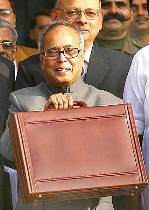For how many more years will the annual Budget circus continue in its current form? This is a question often asked at post-Budget seminars held across the country every year around this time.
 Calling the annual Budget a circus has some justification. With tax rates becoming more or less stable, the annual Budget of the Union government is now largely about expenditure allocation in tune with the policy priorities of the finance minister and the political leadership at the Centre.
Calling the annual Budget a circus has some justification. With tax rates becoming more or less stable, the annual Budget of the Union government is now largely about expenditure allocation in tune with the policy priorities of the finance minister and the political leadership at the Centre.
Has the government spent more on infrastructure? Could the finance minister reduce the fiscal deficit a little further? The curiosity that the Budget continues to arouse on the taxation front should also disappear next year when the proposed direct taxes code is in place and the goods and services tax becomes part of the country's indirect tax regime.
Why should the annual Budget then still be a major media event? Similarly, what would then be the justification for continuing with the series of minor events now held, with great fanfare, to analyse the various proposals the finance minister announces in his speech? Indeed, there are no rational explanations.
Take a look at the annual Budget of any developed country or even an emerging economy. There is no such hype, excitement or a series of events around the government's annual budget exercise. This is purely an Indian innovation. The annual Budget is now a mega event in which the finance minister revels as much as his team of senior officials.
In many ways, the transformation of the annual Budget into a mega national event is a post-reforms phenomenon. Economic reforms definitely ensured that more and more Indians got interested in the Budget. Since reforms also meant lower taxes and duties in addition to simplification of the taxation regime, the annual Budget exercise created an inevitable feel-good factor. No finance minister could let go such an opportunity to wax eloquent on what his Budget was going to mean for an individual's pockets and for the economy's growth.
What aided that hype and excitement was the emergence of several new television news channels in the 1990s. In the last decade or so, the number of television channels has only increased and their interest in the Budget has risen, contributing further to the hype and excitement of the finance minister's annual exercise. The print media has not lagged behind. Newspapers too have realised that there is a lot of merit in exploiting the Budget and its content for offering more to the readers. Undoubtedly, competition among newspapers and television channels has provided a further boost to this annual Budget circus.
Finance ministers too seem to have played along with this transformation. Over the years, the finance minister's Budget speech has become longer. Increasingly, finance ministers have spent more time on announcing minute details of tax rate changes, even though merely tabling the papers on the tax rate change would have served the purpose. Yashwant Sinha's decision to present the Budget at around noon, instead of at 5 pm, also made sure that the government had a longer time to hog the limelight before the event became a day old.
Finance ministers have also shown the tendency to announce a list of reformist measures in areas not monitored by their own ministry, a move that, on many occasions, has boomeranged because other ministries never implemented those decisions. However, these were only minor setbacks. The mind space a finance minister grabs by making those grand policy announcements is a big enough gain to compensate for the embarrassment caused by the failure to implement those decisions later. Senior officials of the finance ministry have also benefited from the annual Budget circus, flitting from one television channel studio to the other and sharing with the viewers their understanding of the new fiscal policy initiatives.
In such a scenario, where everybody seems to be benefiting, there is little chance of the annual Budget circus returning to its old sedate form and shape. The tax policy may become more stable and the government's expenditure priorities may soon lose their ability to spring a surprise year after year. However, it will take a brave finance minister to reduce the Budget to a short and simple exercise without the current hype and excitement. Most significantly, no finance minister can possibly strike a blow at the formidable alliance of beneficiaries of the annual Budget exercise.
Make no mistake that the media is one of those formidable beneficiaries. For the media, the Budget is not just an opportunity to present and analyse the government's fiscal policy initiatives. It has now become an important annual revenue source. So, even if the Budget becomes predictable and the finance minister decides to avoid being part of an annual circus, the media will do its best to ensure that the circus continues to prosper as long as it can. Is there anybody who thinks otherwise?






